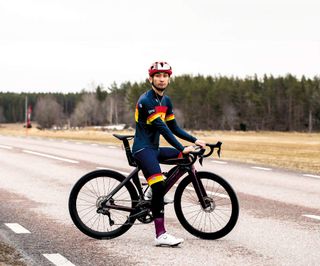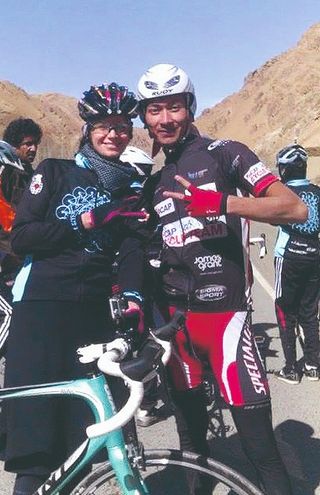I’m going to be knowledgeable bicycle owner,” Amir Ansari advised a buddy resolutely, days after crossing the Aegean Sea in a small rubber boat. It was autumn 2015 and only some weeks earlier he had fl ed from Afghanistan looking for security, carrying with him solely the contents of a small backpack. His dream, because it existed then, couldn’t have been extra distant from the fact of his state of affairs.
Ansari, now 24, was born as a refugee in Iran in 1999, the place he grew up for the primary 10 years of his life along with his mom, father and three youthful siblings. He and his household are Hazara, one of many teams who’re systematically persecuted by the Taliban. In 2009, western forces had been making an elevated push in opposition to the Taliban in Afghanistan, and the Ansari household returned to their homeland, transferring to western Kabul, to the relative safety of a neighborhood the place Hazara had been within the majority.
As a toddler, Ansari cycled by way of the busy streets of Kabul to high school as an inexpensive mode of transport. The bike was a long time previous, however it gave him a way of freedom he’d by no means felt earlier than. At some point whereas on his commute, he noticed a pair of cyclists on highway bikes, clad in Lycra. “They simply appeared cool,” he tells me by video name from his residence in Uppsala, Sweden. “I needed to strive it.” Th is innocuous second ignited in Ansari the unlikeliest of desires.
After befriending the 2 cyclists, he joined them on coaching rides on a borrowed highway bike. They’d experience three hours into the foothills of the majestic Hindu Kush mountain vary and again once more. He turned a part of the small however lively Afghan biking neighborhood and dreamed of someday, one way or the other, turning into Afghanistan’s first skilled bicycle owner.

Ansari has his eyes set on the largest sporting stage of all in Paris this summer season,
(Picture credit score: Albert Karlsson)
Looking for refuge in Europe
The mid-2010s noticed the rise of ISIL (later referred to as IS) who additionally focused the Hazara individuals. Tales of executions and kidnappings had been commonplace. The beforehand protected neighborhood the place the Ansari household lived now witnessed common assaults. In 2015, Ansari’s mom determined that her son, then 16, ought to flee the nation by himself looking for a safer, extra affluent life.
His father had died, and she or he felt that this was the one probability for a minimum of one of many household to stay the life she hoped dearly for. “You’ll die anyway in case you keep right here,” Ansari recollects his mom telling him. “She didn’t need me to die in Afghanistan in an explosion or some terror assault,” he says. “She needed me to provide it a attempt to make my future… their future.” The choice was made. Mom and son sat silently, taking a look at one another. “I believe in that look we communicated a number of phrases with out saying something,” he says.
Ansari left his household with one aim in thoughts: Europe. He travelled to the west coast of Turkey, to the place with the shortest water crossing to the security of Greek territory. “Round 3am, they began pumping up the gummy boat,” Ansari remembers. “It’s for 9 individuals, however they simply put in 20 or 30.” Making it to the island of Lesbos, to one of many largest refugee camps in Europe, Ansari was relieved to be alive.
The newest race content material, interviews, options, opinions and skilled shopping for guides, direct to your inbox!
Just a few days earlier than, he had messaged his buddy, the US adventurer-activist Shannon Galpin, whom he had met whereas she was growing the primary era of feminine Afghan cyclists. Galpin was in Colorado on the time, however when she realised Ansari wanted assist, she dropped the whole lot and flew to Greece to satisfy him. They rode collectively from Athens. “He was pretty stoic till we bought again down into city,” Galpin recollects. “Then he simply appeared exhausted. It broke my coronary heart.” She may see the impact that exile was having on Ansari, however recollects that he didn’t appear scared, solely decided. Focusing not simply on the journey and what he needed to do subsequent, Ansari was additionally holding on to his hope for the longer term.
Even at this level, he reasserted his dream of turning into a bicycle owner. “That’s the factor that saved him going, that saved him placing one foot in entrance of the opposite,” Galpin says. On buses, rails and toes, Ansari made his method north, lastly ending up in Stockholm, Sweden.

With activist buddy Shannon Galpin (left) in Afghanistan
(Picture credit score: Amir Ansari)
Historical past of the Hazara
Amir Ansari grew up in Afghanistan, his household belonging to the Hazara ethnic group, Shia Muslims who’re persecuted by the Taliban.
The Hazara are one of many largest ethnic minorities in Afghanistan.
There have been stories of Hazara discrimination in Afghanistan for over 400 years.
The group continues to be focused as Shia Muslims in a majority Sunni Muslim nation.
In 1998 one of the crucial brutal assaults on Hazara came about within the metropolis of Mazar-i-Sharif, the place hundreds had been systematically executed.
As we speak assaults on Hazara in Afghanistan proceed regularly, and hundreds have fled to different nations to hunt refuge.
A brand new life in Sweden
Ansari moved right into a camp for asylum seekers which provided a variety of sporting actions – however he simply needed to cycle. After looking out on-line, he organized to hitch Stockholm Cykleklubb for a session. One of many first individuals Ansari met on the membership was Pierre Moncorgé, a French Continental-level racer and a coach on the membership.
Moncorgé describes he preliminary impression of Ansari as “a reasonably shy teenager” clearly affected by the journey he had undertaken. “Nevertheless, as quickly as he was on the bike or across the membership he was so comfortable to be there, all the time smiling and sort to everybody.” The membership was the proper escape for Ansari, who was fast-tracked to their elite workforce, which raced throughout Sweden. He confirmed “nice potential,” based on his new coach Moncorgé, and was nicknamed “the Afghan Peter Sagan” due to his punchy talents and the way he idolised the good Slovakian.
Away from the membership, life within the camp was powerful. Ansari skilled a deep melancholy and started having suicidal ideas. It was whereas in considered one of his darkest moments that he once more messaged Galpin, who replied: “Tomorrow, you’re going to go biking together with your membership. Promise me that, Amir.” Trying again, Galpin is satisfied, “It was the bike that saved his life”.
The immigration course of proved endlessly tough. Though Ansari was helped by a lawyer on the biking membership, political strain meant virtually each residency software was denied. Lastly he was kicked out of the camp, rendered homeless. It was the biking membership who got here to his rescue. A household from the membership had a spare bed room and took him in.
Ansari was grateful, however his melancholy didn’t abate. By way of remedy, the help of his new Swedish household – the place he turned an “additional son” – and biking, Ansari began to rebuild his life. “The household had been an enormous help. They had been so sort. They made me suppose so positively; to look on the brilliant aspect of life. The entire of the Stockholm Biking Membership was like my household as properly.”

Ansari’s a proficient time triallist
(Picture credit score: Getty Pictures)
Olympic Refugee Staff: ‘‘They’ll characterize the hundreds of thousands displaced globally’
The IOC Refugee Olympic workforce was created in 2015, represented by 10 athletes on the 2016 Video games in Rio. It has greater than tripled in measurement since then, with 36 refugee athletes on account of compete in Paris. Amir Ansari is considered one of two cyclists on the workforce, the opposite being Ethiopian Eyeru Tesfoam Gebru, who will participate within the girls’s highway race. Eleven international locations can be represented throughout 12 totally different sports activities. A lot of the athletes had been chosen from among the many refugee athletes supported by the IOC by way of the Refugee Athletes Scholarship Programme.
The workforce’s look on the Olympics will draw consideration to the plight of the estimated 114 million individuals forcibly displaced worldwide. The UN excessive commissioner for refugees Filippo Grandi acknowledged: “The Refugee Olympic Staff ought to remind us of the resilience, braveness and hopes of all these uprooted by battle and persecution”.
Desires turn into actuality
Whereas balancing college along with his coaching, Ansari travelled across the nation to race. Sweden is a nation the place time trialling is the first self-discipline, in order that quickly turned his most important focus. The Taliban returned to energy in Afghanistan in 2021 because the USA pulled out troops. Ansari’s mom and siblings escaped again to Iran the day earlier than Kabul fell. It was a fearful time for Hazara in Afghanistan, however a time of alternative for Ansari in Sweden. He was granted non permanent residency, was in a position to apply for college, and began working in a college for kids with disabilities. He additionally competed in his first UCI races in Poland, and completed ninth within the 2021 Swedish Nationwide Time Trial Championships.
A good greater breakthrough got here when Ansari was provided a scholarship by the Olympic Refugee Basis, which granted a spot on the 2023 World Championships in Glasgow and the potential of future Olympic alternatives. The expertise in Glasgow was momentous for Ansari, the realisation of his long-held ambition. “All the way in which I believed it was a dream,” he says, “till the TTT within the metropolis. I began main out the workforce for the primary nook and I believed: ‘wait, no it’s not a dream. Get up, Amir, it’s important to push now’. It was top-of-the-line weeks of my life. I’m not going to overlook it.”
Now Ansari has his eyes set on the largest sporting stage of all in Paris this summer season, the place he’ll compete with the Olympic Refugee squad. He has not too long ago began finding out for a level in structural engineering at Sweden’s College of Uppsala, however spends each spare second coaching, guided by coach Moncorgé. “My entire life in the mean time is mattress, coaching, go to high school, consuming. The dream makes me motivated to be disciplined.”
Ansari doesn’t consider himself as Afghan anymore. He’s Hazara, and in that id he feels the load of a tortured communal historical past. He hopes that his look within the Olympic Video games time trial will give hope to others who’ve needed to flee their homelands. “On this world, we see battle in every single place,” he says. “Lots of people are shedding their desires. They could want an instance to indicate them that there’s a probability, there’s a hope. Within the Olympic Refugee Staff, I believe we hold that dream alive for these individuals.”

